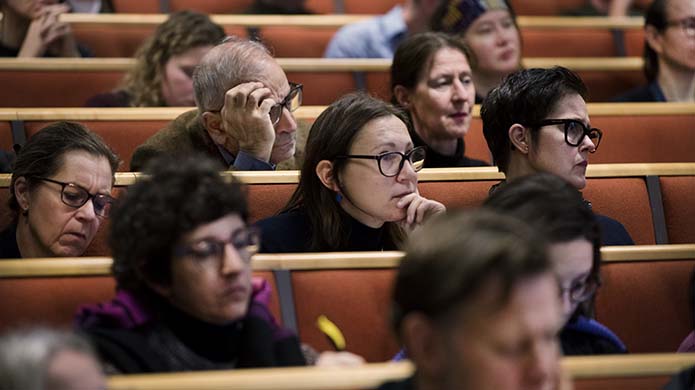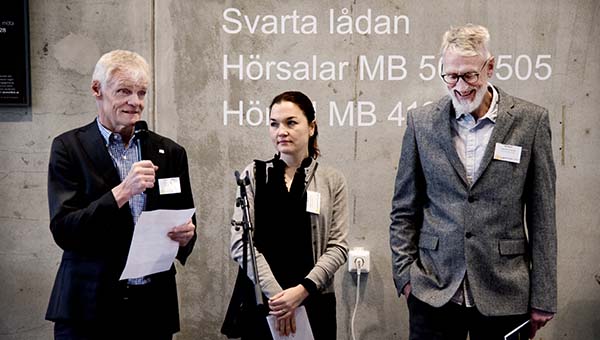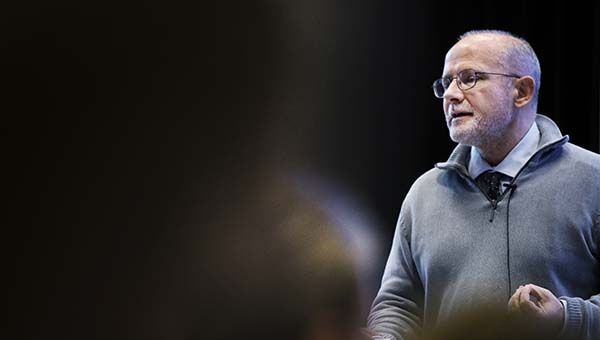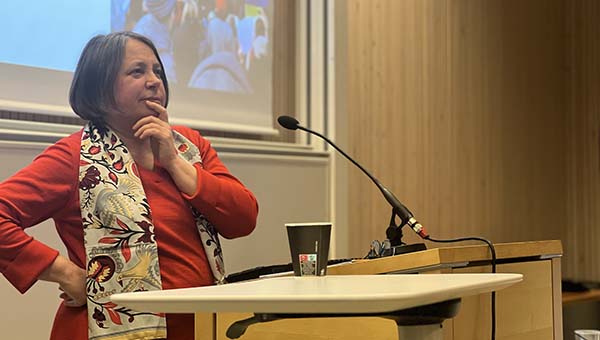CBEES annual conference – well-attended and full of insight
The Centre for Baltic and East European Studies offered a wide-ranging and inspiring programme for participants in its annual conference. However, it was once again characterised by a serious and gloomy theme, that of Russia’s war on Ukraine and its consequences.

Last week, researchers from numerous universities, both in Sweden and abroad, visited Södertörn University to attend the CBEES Annual Conference – two days of talks and discussions on current research. The conference was the biggest and most well-attended in CBEES’ history.
The research that was presented covered everything from the role of museums in the war and how religious imagery is used in communication, to the significance of the war for the Caucasus region and European energy supplies.
“The great interest and the substantial programme demonstrate the importance of arenas where researchers can meet and discuss current issues in research and society, and that civil society can also be involved. It is clear that CBEES is an important actor here, and that our researchers and expertise can provide critical reflections on contemporary challenges,” says Per Bolin, CBEES’ director.
Barriers to peace negotiations
One of the conference’s two keynote speakers was Andreas Umland, political scientist from the Stockholm Centre for Eastern European Studies, at the Swedish Institute of International Affairs. In his presentation, he talked about the barriers that he sees to peace negotiations between Russia and Ukraine. These include both countries’ constitutions, their domestic politics and the situation in Crimea.
Peace negotiations almost always entail compromises. In his presentation, Andreas Umland highlighted how these compromises can – to some extent – be difficult to achieve because they involve changes to the countries’ territories. Giving up land to an enemy can have a significant impact on public opinion, but may also contravene the constitution and thus make negotiations harder.
Alar Kilp, political scientist from the University of Tartu, was one of those listening with great interest.
“Andreas Umland’s lecture brought up many new thoughts, and the issues it brought up about how we can’t always be objective, not always see everything. We have a similar conference at my university, they are a complement to each other,” he says.
A new Ukrainian diaspora
The conference’s other keynote speaker was Tatiana Zhurzhenko. Her research focuses on borders and borderlands in post-Soviet nations and memory politics in Belarus, Russia and Ukraine. In her presentation, she talked about the growth of a new Ukrainian diaspora, what it means that many Ukrainians are leaving the country, and Ukrainians now living in Russia.
She also talked about the difference between earlier periods in which many people left the country, where the reasons for migration are an important difference. The diaspora that is now found in many places, particularly in Europe, supports it homeland and shares that same narrative, values and geopolitical direction. At the same time, they contribute to the communities they moved to. Ukrainians who left during the Soviet era often did so due to political repression. These differences means that another identity is emerging among the groups who are now outside the national borders.
Visitors’ impressions
As so often, when people with similar interests meet the coffee breaks and lunches are filled with lively conversation and exchanges. Sofie Bedford, a political scientist from Uppsala University, was among those who had travelled to Södertörn University. She works at the Institute for Russian and Eurasian Studies and participated in a panel on the Russian invasion’s significance in the Caucasus.
“The great thing about conferences like this is usually the networking, meeting new and old acquaintances and chatting. There’ve been many interesting discussions and these are obviously issues that affect people, not just professionally. The conflicts in the region stir up emotions. Based on the discussion, I think I can see and increased interest in China’s role,” she says.
The task of academia
The driving forces behind this year’s conference were Julia Malitska, PhD in history, Yulia Gradskova, docent in history, and Irina Seits, PhD in aesthetics.
“When Yulia and I launched the call for papers this April, we had no idea the interest would be so huge. We’re living through a time of rapid change and transformation. Our task as academics is to capture and explain these changes, to have difficult and challenging conversations and so provide meaning for society. This entails continual examination and revision of our academic tools and approaches, so we can capture and explain the reality behind the doors and walls of academia in the most meaningful way possible. For me, this was one of the main reasons for this conference,” says Malitska.
Strong research environment
Research into the Baltic Sea region and Eastern Europe plays an important role at Södertörn University, and has been conducted at all of the university’s academic schools since the university was founded in 1996. Researchers who examine, explain and actively participate in analyses of ongoing change in the region, using different disciplinary perspectives, are all gathered under one roof.
“This is a well-established research profile and our researchers possess a great deal of expertise, which illuminates and explains developments in the region from multiple perspectives, both now and in the past. This is apparent through the interest and enthusiasm for the conference,” says Gustav Amberg, vice-chancellor of Södertörn University.

Rektor Gustav Amberg, doktor Julia Malitska och Per Bolin, föreståndare för CBEES öppnar årets konferens.
Hinder för fredsförhandlingar
En av konferensens två huvudtalare var Andreas Umland, statsvetare från Centrum för Östeuropastudier (SCEEUS) vid Utrikespolitiska Institutet. I sin presentation talade han om de hinder han ser står i vägen för fredsförhandlingar mellan Ryssland och Ukraina. Några av dem är de bägge ländernas konstitutionerna, deras inrikespolitik men också situationen på Krimhalvön.
Fredsförhandlingar innebär nästan alltid kompromisser. Andreas Umland lyfte i presentationen hur de här kompromisserna i viss mån kan vara svåra att nå då de innebär förändringar i ländernas territorier. Att ge upp land till en motståndare kan kraftigt påverka opinionen i landet men kan också gå emot konstitutionen och därmed försvåra förhandlingarna.

Andreas Umland.
Alar Kilp, statsvetare från Tartu universitet, var en av dem som lyssnade med stort intresse.
– Andreas Umlands föreläsning väckte många nya tankar, och de frågor som lyftes kring att inte man inte alltid kan vara objektiv, att man inte alltid kan se allt. Vi har också en liknande konferens vid mitt universitet och de kompletterar varandra, säger han.
En ny ukrainsk diaspora
Konferensen andra huvudtalare var Tatiana Zhurzhenko som i sin forskning intresserat sig för bland annat gränser och gränsområden i post-sovjetiska länder och minnespolitik i Belarus, Ryssland och Ukraina. I sin presentation talade hon om framväxten av en ny ukrainsk diaspora, innebörden av att många ukrainare lämnar landet och ukrainare som idag lever i Ryssland.
Hon talade också om skillnaden mellan tidigare perioder då många människor lämnat landet, där anledningen till flykten utgör en viktig skillnad. Den diaspora som idag befinner sig på olika håll i framför allt Europa stöttar sitt hemland och delar samma narrativ, värderingar och geopolitiska inriktning. Samtidigt som de också bidrar till det samhälle de flyttat. Ukrainare som lämnade under den sovjetiska eran gjorde ofta på grund av politiskt förtryck. De här skillnaderna gör att en annan identitet växer fram bland de grupper som befinner sig utanför landets gränser idag.

Tatiana Zhurzhenko
Intryck från besökare
Som så ofta när människor med liknande intressen möts fylls kaffepauser och luncher av livliga samtal och utbyten av insikter. Sofie Bedford, statsvetare från Uppsala universitet var en av dem som tagit sig till Södertörns högskola. Hon är verksam vid Institutet för Rysslands- och Eurasienstudier och deltog i en panel om den ryska invasionens betydelse för Kaukasus.
– Behållning med konferenser som denna är ofta nätverkandet, att träffa nya och gamla bekanta och samtala. Det har varit många intressanta diskussioner och det märks att det är frågor som berör, inte bara på ett professionellt plan. Konflikterna i regionen rör upp känslor. Utifrån diskussionerna tycker mig också se ett ökat intresse för Kinas roll säger hon.
Akademins uppdrag
Bakom årets konferens står Julia Malitska, doktor i historia, Yulia Gradskova, docent i historia och Irina Seits, doktor i estetik.
– När jag och Yulia lanserade Call for Papers i april i år kunde vi inte föreställa oss att vi skulle få ett så stort intresse. Vi lever i en tid med snabba förändringar och omvandlingar. Vårt uppdrag som akademiker är att fånga och förklara dessa förändringar, föra svåra och obehagliga samtal och därmed ge mening till samhället. Detta innebär ständig granskning och revidering av våra akademiska instrument och angreppsätt för att så meningsfullt som möjligt fånga upp och förklara verkligheten bakom akademiska väggar och dörrar. För mig var detta en av huvudanledningarna med denna konferens, säger Julia Malitska.
Stark forskningsmiljö
Östersjö- och Östeuropaforskningen har en betydande roll på Södertörns högskola och bedrivs vid högskolans samtliga institutioner sedan högskolan öppnade 1996. Under ett och samma tak samlas forskare som belyser, förklarar och aktivt deltar i analyser av pågående förändringar i området, utifrån flera olika ämnesperspektiv.
– Det är en väl utvecklad forskningsprofil och våra forskare besitter stor kunskap som ur flera olika perspektiv belyser och förklarar utvecklingen i området, både i dag och historiskt. Det blir tydligt med engagemanget och intresset för konferensen, säger Gustav Amberg, rektor vid Södertörns högskola.
Page updated
15-12-2023

